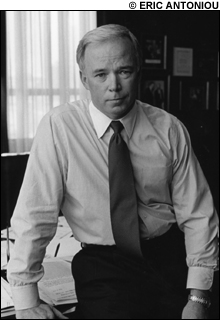
Pat Purcell’s speech last Friday at a UMass Boston conference on ethnic media was auspiciously timed. That very morning, Steve Bailey’s Globe business column reported on heated speculation that Purcell was “close to a deal” to break up his Herald Media empire by selling the suburban-based Community Newspaper Company (CNC), which he bought just five years ago.
Warily eyeing reporters in the audience, Purcell began by declaring, “I can tell you in advance: there will be no news.” And then, seeming a bit distracted and rushed, he delivered a speech that touched on the problems in his business.
“We have to change,” he said. “We’re being ruthlessly efficient behind the curtain. Anywhere we can save a buck, we have to do it.... It’s not a pretty picture for Metro dailies. We are faced with challenges like never before.”
Afterward, during a question-and-answer period, Purcell was confronted by one of his own CNC journalists worried about the future of the operation.
“Is there any way to keep this commitment to local?” she asked.
“I think we’ve done a reasonably good job of serving the local community,” he responded. “This is the hand we were dealt.”
These days, Purcell may not have the winning cards. Ever since the October announcement that he was looking to recapitalize and “explore new strategic opportunities,” it’s been widely known that Herald Media — which includes the flagship Boston tabloid, four other dailies, and more than 100 weeklies, shoppers, and specialty publications — has been in play. (In any scenario, it’s worth noting that four of Purcell’s children and one son-in-law work in the business.)
The rumors have been all over the place. Purcell will re-load with new investors. Or maybe he will cash out to another newspaper operator. He will sell as one package the Herald, which has had serious financial struggles, and CNC, which is thought to be profitable and attractive. Or perhaps he’ll have to split them up. The gossiped-about suitors have ranged from unnamed equity firms to the well-known Denver-based newspaper mogul William Dean Singleton.
Bailey’s reporting — that a buyer might spend about $400 million to grab the CNC chain in a package with the Quincy Patriot Ledger and the Brockton Enterprise while Purcell hangs on to the Herald — came amid feverish rumors of an announcement.
Notoriously close-mouthed, Purcell poured tepid water on that idea last Friday when asked if he would soon have major news.
“Probably not,” he said tersely.
But that does little to allay the concerns of a city wondering how much longer it will remain a two-newspaper town or to calm the nerves of jittery Herald Media employees.
Acknowledging that a new rumor about the company’s future crops up practically every day, one Herald staffer admits that “it’s impossible to say now which theory has more weight. I think things are really in limbo now.”
A mom-and-pop shop
“Our purchase of Community Newspapers in 2001 was a kind of swimming-against-the-tide move,” Purcell said on Friday. When he bought CNC from Fidelity Investments in a deal reported at around $150 million, Purcell was following the advice of his mentor, Rupert Murdoch: “You grow or you die.”
Having purchased the Herald from Murdoch in 1994, Purcell had been pushing hard to consummate a CNC deal since 1998, and he even mapped out a scenario to buy not only Fidelity’s operation but also the Ledger and Enterprise when they came on the market. That didn’t happen. But in 2002, Purcell made an effort to buy the Salem, Gloucester, and Newburyport dailies, which were snatched up by the Eagle-Tribune Co. He was a player.
But he has also had his hands full with CNC, an unwieldy Frankenstein’s monster of a newspaper chain that had been assembled in the ’90s by Fidelity under the direction of a mild-mannered venture capitalist named Bill Elfers.
Under Fidelity, CNC had its share of growing pains, including a corporate culture unfamiliar with the newspaper business and a revolving door of executives who tried and failed to turn its fortunes around.
By the mid ’90s, Fidelity had already invested about $100 million and CNC was still leaking red ink. (It is believed that CNC did turn a profit in its last few Fidelity years, particularly after significant job cuts.)
Then there’s the daunting task of being a good community-journalism steward. Papers like the Globe and the Herald may dominate the regional-media landscape. But many people have a more intimate and often more intense attachment to their local weekly.